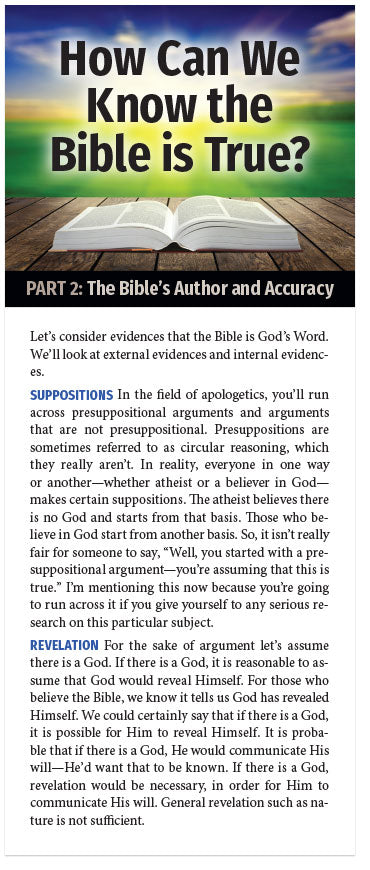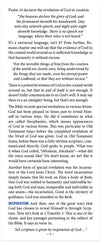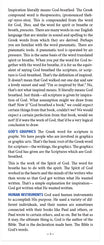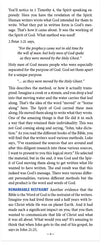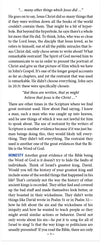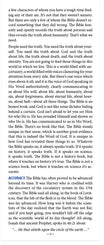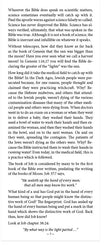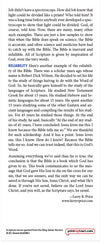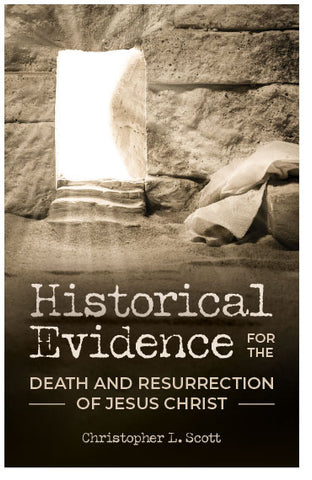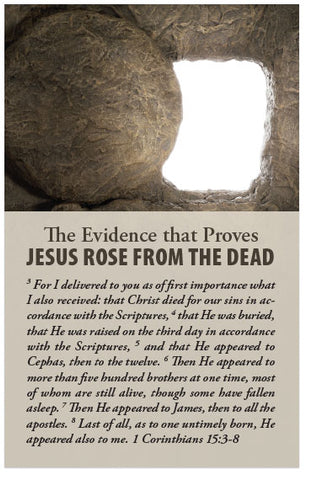How Can We Know The Bible Is True? (Part 2 of 5)
Special-Order Folded Flyer Tract
 NOTE: This item is custom-printed to order (click for more details).
NOTE: This item is custom-printed to order (click for more details).
This tract is from our print-on-demand library, and is not kept in stock. Select the options below, and we will custom-print a batch just for you. Because this item is custom-printed, you can add your custom imprint to the back page at no extra cost.
- Estimated shipping date: Monday, February 16 (Click for more details)
- SKU:
- Discounts: Discount coupons do not apply to this item
- Format: Folded Flyer Tract
- Size: 3.5 inches x 8.5 inches
- Pages: 8
- Imprinting: Available with 4 lines of custom text
- Version: KJV
- Returns: Because this item is custom-printed to order, it cannot be returned.
Show all item details
The full text of this flyer tract is shown below in the KJV version. (Do you want to print this tract in a different version than the one listed? Contact us and let us know what you're looking for—we may be able to create the alternate version for you at no charge.)
Let’s consider evidences that the Bible is God’s Word. We’ll look at external evidences and internal evidences.
Suppositions In the field of apologetics, you’ll run across presuppositional arguments and arguments that are not presuppositional. Presuppositions are sometimes referred to as circular reasoning, which they really aren’t. In reality, everyone in one way or another—whether atheist or a believer in God—makes certain suppositions. The atheist believes there is no God and starts from that basis. Those who believe in God start from another basis. So, it isn’t really fair for someone to say, “Well, you started with a presuppositional argument—you’re assuming that this is true.” I’m mentioning this now because you’re going to run across it if you give yourself to any serious research on this particular subject.
Revelation For the sake of argument let’s assume there is a God. If there is a God, it is reasonable to assume that God would reveal Himself. For those who believe the Bible, we know it tells us God has revealed Himself. We could certainly say that if there is a God, it is possible for Him to reveal Himself. It is probable that if there is a God, He would communicate His will—He’d want that to be known. If there is a God, revelation would be necessary, in order for Him to communicate His will. General revelation such as nature is not sufficient.
Psalm 19 declares the revelation of God in creation.
“The heavens declare the glory of God; and the firmament sheweth his handywork. Day unto day uttereth speech, and night unto night sheweth knowledge. There is no speech nor language, where their voice is not heard.”
It’s a universal language, isn’t it? Even further, Romans chapter one will say that the evidence of God in the created world around us is sufficient knowledge so that humanity is without excuse:
“For the invisible things of him from the creation of the world are clearly seen, being understood by the things that are made, even his eternal power and Godhead; so that they are without excuse.”
There is a powerful witness of God in the created world around us, but that in and of itself is not enough. It doesn’t fully communicate to us God’s will. It may say there is a an almighty being, but that’s not enough.
The Bible records special revelations in various forms. God has been pleased in times past to reveal Himself in various ways. He did it sometimes in what are called theophanies, which means appearances of God in various forms. This was particular to Old Testament times before the completed revelation of the Word of God was given. God in Old Testament times, before there was a fully-written scripture, communicated directly. God spoke to people. What was it when God called, “Abraham, Abraham”—what did the voice sound like? We don’t know, do we? But it would have certainly been interesting.
Another form of special revelation was the incarnation of the Lord Jesus Christ. The word incarnation simply means that He took on Him a body of flesh; that God was welded to humanity and indivisible being both God and man, inseparable and indivisible in one union—the incarnation. Great is the mystery of godliness. God was manifest in the flesh.
Inspiration And then, one of the great ways that God has chosen to reveal Himself is through Scripture. Now let’s look at 2 Timothy 3. This is one of the classic and key passages pertaining to the subject of the Bible. It says in verse 16,
“All scripture is given by inspiration of God …”
Inspiration literally means God-breathed. The Greek compound word is theopneustos, (pronounced theh-op’-nyoo-stos). This is compounded from the word for God, Theo, and the word for spirit or breathe or breath, pneustos. There are many words in our English language that are similar in sound and spelling to the Greek words from which they are derived. Perhaps you are familiar with the word pneumatic. There are pneumatic tools. A pneumatic tool is operated by air pressure. This is the same basis of the word translated spirit or breathe. When you put the word for God together with the word for breathe, it is for us the equivalent of saying God breathed the scripture, or scripture is God-breathed. That’s the definition of inspired. It doesn’t mean that God walked out one day and saw a lovely sunset and said “I’m so inspired by that.” No, that’s not what inspired means. It literally means God breathed. Just think—all scripture is given by inspiration of God. What assumption might we draw from that? Now if “God breathed a book,” we could expect certain things from that book, couldn’t we? We would expect a certain perfection from that book, would we not? If it were the work of God, that’d be a very logical conclusion to draw.
God’s Graphics The Greek word for scripture is graphe. We have people who are involved in graphics or graphic arts. That’s the basic root of the Greek word for scripture—the writings, the graphics. The graphics that God has given are the Scriptures which are God-breathed.
This is the work of the Spirit of God. The word for breathe has to do with the spirit. The Spirit of God worked in the hearts and the minds of the writers who then wrote so that God got written what He wanted written. That’s a simple explanation for inspiration—God got written what He wanted written.
Human Instruments God used human instruments to accomplish His purpose. He used a variety of different individuals, and their names are sometimes connected with their books like Paul and others, or Paul wrote to certain others, and so on. But be that as it may, the ultimate thing is, God is the author of the Bible. That is the declaration made here. The Bible is God’s words.
You’ll notice in 1 Timothy 4, the Spirit speaking expressly. Here you have the revelation of the Spirit. Human writers wrote what God intended for them to write. What they put in written form is God’s message. That’s how it came about. It was the working of the Spirit of God. What method was used?
2 Peter 1:21 says,
“For the prophecy came not in old time by the will of man: but holy men of God spake as they were moved by the Holy Ghost.”
Holy men of God means people who were especially separated for the purpose of God. God set them apart for a unique purpose.
“… as they were moved by the Holy Ghost.”
This describes the method, or how it actually transpired. Imagine a creek or a stream, and you drop a leaf into that moving water and the water carries that leaf along. That’s the idea of the word “moved” or “borne along” here. The Spirit of God carried these men along; He moved them along to write what they wrote. One of the amazing things is that He did it in such a way that they retained their individuality. This was not God coming along and saying, “John, take dictation.” As you read the different books of the Bible, you will find that the writers used various methods. Luke says, “I’ve examined the sources that are around and after this diligent research into these various sources, I want to present to you this logical story.” He selected the material, but in the end, it was God and the Spirit of God moving them along to get written what He wanted to have written. The end result was that this indeed was God’s message. There were various different personalities, various different methods but the end product is the word and words of God.
Remarkable Restraint Another evidence that the Bible is the Word of God is the restraint of the writers. Imagine you had lived three and a half years with Jesus Christ while He was on planet Earth. And it had made such a significant impact on you, that you then wanted to communicate that life of Christ and what it was all about. What would you say? It’s amazing to think that when John gets to the end of his gospel, he says in John 21:25,
“… many other things which Jesus did …”
He goes on to say, Jesus Christ did so many things that if they were written down all the books of the world couldn’t contain them. That might be a bit of hyperbole. But beyond the hyperbole, he says there’s a whole lot more that He did. To think, John, who was so close to the Lord Jesus, the disciple that Jesus loved, as he refers to himself, out of all the public miracles that Jesus Christ did, only chose seven to write about! What remarkable restraint! The Spirit of God moved him to communicate to us in order to present the portrait of Christ and give us that picture of Him which we have in John’s Gospel. It’s one of the longer gospel accounts as far as chapters, and yet the restraint that was used is remarkable. He didn’t choose everything. John says in 20:31 these were specifically chosen:
“But these are written, that ye might believe that Jesus is the Christ …”
There are other times in the Scripture where we find great restraint used. How about Paul saying, I knew a man, such a man who was caught up into heaven, and he saw things of which it was not lawful for him to speak about. The use of restraint by the writers of Scripture is another evidence because if it was just human beings doing this, they would likely tell everything. They didn’t tell everything. The restraint they used is another one of the great evidences that the Bible is the Word of God.
Honesty Another great evidence of the Bible being the Word of God is it doesn’t try to hide the faults of individuals. Think of Israel’s greatest king, David. Would you tell the history of your greatest king and include some of the sordid things that happened in his life? That’s certainly not the way the history of other ancient kings is recorded. They either lied and covered up the bad stuff and made themselves look better, or they boasted in their wickedness. They didn’t write things like David wrote in Psalm 51 or in Psalm 32—how he felt about the sin and the wickedness of his iniquity and how he wanted to teach people so they might avoid similar actions or behavior. David not only wrote about his sin—he put it to song for all of Israel to sing! Is that the way kings or politicians are usually presented? If you read the Bible, there are only a few characters of whom you have a tough time finding any of their sin. It’s not that they weren’t sinners. But there are only a few of whom the Bible doesn’t record something that they did wrong. The Bible honestly and openly records the truth about persons and thus reveals the truth about humanity. That’s what we need.
People need the truth. You need the truth about yourself. You need the truth about God and the truth about life, the truth about death, and the truth about eternity. You are not going to find those things in this world in which we live. This is a world filled with uncertainty, a world filled with voices clamoring for your attention from every side. But there’s one voice which rises above it all, and it is the voice of God speaking in His Word authoritatively, clearly communicating to us about His will, about life, about humanity, about sin, about forgiveness, about eternal life, about heaven, about hell—about all these things. The Bible is an honest book, and God is not like some dictator hiding behind a curtain. God isn’t afraid to let you see Him for who He is. He has revealed Himself and shown us who He is. He has communicated to us in His Word, the Bible. There’s no book like that. The Bible stands unique in that sense, which is another great evidence that this is indeed the Word of God. It is unique in how God has revealed these things to us. Whatever the Bible speaks on, it always speaks truth. If it speaks on history, it speaks truth. If it speaks on science, it speaks truth. The Bible is not a history book, but where it touches on history it’s true. The Bible is not a science book, but where it touches on science it’s accurate.
Accuracy The Bible has often proved to be advanced beyond its time. It was Harvey who is credited with the discovery of the circulatory system in the 17th century. The Bible said all along, in the book of Leviticus, that the life of the flesh is in the blood. The Bible was far advanced. How long was it before the scientists of the day realized that the Earth was not flat, and if you kept going, you wouldn’t fall off the edge as the scientific world of its day thought? All along, Isaiah that ancient Prophet, spoke in 40:21 about
“… He that sitteth upon the circle of the earth …”
Wherever the Bible does speak on scientific matters, science sometimes eventually will catch up with it. Paul the apostle warns against science falsely so called. Science has never disproved the Bible. Science has always verified, ultimately, that what was spoken in the Bible was true. Although it is not a book of science, the Bible is inerrant and infallible on whatever it speaks.
Without telescopes, how did they know as far back as the book of Genesis that the sun was bigger than the moon? Have you ever seen what we call a harvest moon? In Genesis 1:16,17 you will find the Bible declaring the greater of the “lights” was the sun.
How long did it take the medical field to catch up with the Bible? In the Dark Ages, Jewish people were persecuted because, for one reason, people thought and claimed they were practicing witchcraft. Why? Because the Hebrew midwives, and others that attended to the Jewish people, weren’t dying of the various contamination diseases that many of the other medical people and others were dying from. When doctors went in to do an exam on a woman or when they went in to deliver a baby, they washed their hands. They used a bowl of water to wash their hands and then examined the woman, and then they washed their hands in the bowl, and on to the next woman. On and on they went, spreading the contagion. The patients of the Jews weren’t dying as the others were. Why? Because the Bible instructed them to wash their hands in running water! Even today, in the medical field, this is a practice which is followed.
The book of Job is considered by many to be the first book of the Bible ever written, predating the writing of the books of Moses. Job 37:7 says,
“He sealeth up the hand of every man; that all men may know his work.”
What kind of a seal has God put in the hand of every human being so that people might know the distinctive work of God? The fingerprint. God has sealed up the hand of every human being and put a mark in that hand which shows the distinctive work of God. Back then, how did Job know?
Look at Job chapter 38:24:
“By what way is the light parted …”
Job didn’t have a spectroscope. How did Job know that light could be divided like a prism? Who told him? It was a long time before anybody ever developed a spectroscope to show that light could be divided. God, of course, told him. Now, there are many, many other such examples. These are just a few samples to show that when the Bible does speak on science, the Bible is accurate, and often science and medicine have had to catch up with the Bible. The Bible is inerrant and infallible. All of Scripture is given by inspiration of God, even the very words.
Reliability Here’s another example of the reliability of the Bible. There was a scholar years ago whose name is Robert Dick Wilson. He decided to set his life to the study of things haivng to do with the Word of God. So, he basically gave himself to the study of the languages of Scripture. He studied New Testament Greek for about 15 years. He studied Hebrew and Semitic languages for about 15 years. He spent another 15 years studying some of the other Eastern and ancient languages and compiling the results of his studies. For 45 years he studied those things. At the end of his study, he said, basically “At the end of my studies of 45 years, I have concluded: Jesus loves me this I know because the Bible tells me so.” We are thankful for such scholarship. And it has a point. Jesus loves me, this I know. How do I know? Because the Bible tells me so. And we can trust indeed, that this is God’s Word.
Assuming everything we’ve said thus far is true, the conclusion is that the Bible is a book which God has given to us. This book communicates to us the message that God gave His Son to die on the cross for our sin; that we are sinners, and the only way we can be saved is through His Son, Jesus Christ, and what He’s done. If you’re not saved, believe on the Lord Jesus Christ, and you will, as the Scripture says, be saved.
—Larry R. Price
www.larryrprice.com

